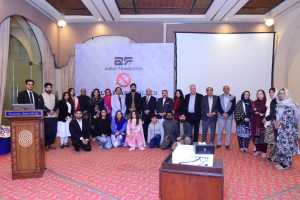 Islamabad: Rising tobacco and nicotine use among Pakistan’s youth, especially around educational institutions, emerged as the central concern at a national review session on tobacco control held by the Aurat Foundation in Islamabad.
Participants from Parliament, government departments, health organizations, and civil society warned that easy availability of cigarettes, vapes, nicotine pouches, and flavored tobacco near schools is creating a growing public health threat. The discussion also pointed to a noticeable increase in tobacco use among women, indicating a shifting trend.
The session called for stronger legislation, faster policy action, and strict enforcement to counter the rapid spread of emerging nicotine products. Speakers emphasized that existing laws remain poorly implemented due to procedural delays, weak monitoring, and limited coordination between federal and provincial bodies.
The need for clear parental awareness, community engagement, and better recognition of new nicotine products was highlighted as an essential part of early prevention. Officials noted that families and schools often remain unaware of modern products marketed to young people.
Technical briefings identified major enforcement gaps and policy loopholes that allow the tobacco industry to expand its reach. Participants noted that companies are increasingly using social media trends, entertainment content, and youth-focused marketing to promote vaping in urban areas.
Government representatives reaffirmed ongoing federal efforts to implement the Prohibition of Smoking and Protection of Non-Smokers Health Ordinance 2002 and to tighten regulations where required. Provincial representatives also announced plans to introduce new resolutions to strengthen tobacco control.
Education sector officials raised alarms over the rise of nicotine products around private institutions and called for tougher regulatory checks. Regulatory authorities stressed the need for a broader social movement to counter tobacco use nationwide.
Closing the event, the Aurat Foundation reiterated its commitment to evidence-based advocacy, cross-sector collaboration, and long-term public awareness initiatives aimed at building a healthier, tobacco-free society.
Islamabad: Rising tobacco and nicotine use among Pakistan’s youth, especially around educational institutions, emerged as the central concern at a national review session on tobacco control held by the Aurat Foundation in Islamabad.
Participants from Parliament, government departments, health organizations, and civil society warned that easy availability of cigarettes, vapes, nicotine pouches, and flavored tobacco near schools is creating a growing public health threat. The discussion also pointed to a noticeable increase in tobacco use among women, indicating a shifting trend.
The session called for stronger legislation, faster policy action, and strict enforcement to counter the rapid spread of emerging nicotine products. Speakers emphasized that existing laws remain poorly implemented due to procedural delays, weak monitoring, and limited coordination between federal and provincial bodies.
The need for clear parental awareness, community engagement, and better recognition of new nicotine products was highlighted as an essential part of early prevention. Officials noted that families and schools often remain unaware of modern products marketed to young people.
Technical briefings identified major enforcement gaps and policy loopholes that allow the tobacco industry to expand its reach. Participants noted that companies are increasingly using social media trends, entertainment content, and youth-focused marketing to promote vaping in urban areas.
Government representatives reaffirmed ongoing federal efforts to implement the Prohibition of Smoking and Protection of Non-Smokers Health Ordinance 2002 and to tighten regulations where required. Provincial representatives also announced plans to introduce new resolutions to strengthen tobacco control.
Education sector officials raised alarms over the rise of nicotine products around private institutions and called for tougher regulatory checks. Regulatory authorities stressed the need for a broader social movement to counter tobacco use nationwide.
Closing the event, the Aurat Foundation reiterated its commitment to evidence-based advocacy, cross-sector collaboration, and long-term public awareness initiatives aimed at building a healthier, tobacco-free society.ISLAMABAD: US authorities have failed to fix the responsibility for wastage of $549 million American tax payers’ money for acquiring Italian made faulty G222 aircrafts for Afghan forces, years after the scam surfaced.
The acquisition of the G222 transport planes to provide the logistic support to Afghan National Army Air Corps (now called the Afghan Air Force) began in November 2006, when U.S. Central Command Air Forces developed requirements for a medium lift aircraft for the Afghan National Army Air Corps.
The U.S. Air Force (USAF) decided to acquire refurbished G222 aircraft, retired by the Italian Air Force, from Alenia North America Inc. (Alenia).
After delivery to Afghanistan, it emerged that these aircrafts suffered low mission capability rate, chronic issues with aircraft sustainment, and multiple safety complaints by the pilots and crews who flew them.
In December 2012, the Program Executive Office for Air Force Mobility Programs at the Air Force Life Cycle Management Center notified Alenia that it would not issue a follow-on sustainment contract, effectively ending the G222 program when the contract expired in March 2013.
After the United States Air Force (USAF) failed to find anyone interested in purchasing the aircraft, all 16 planes were sold to an Afghan company as scrap in August and September 2014 for $40,257.
The US leading agency Special Inspector General for Afghanistan Reconstruction (SIGAR) joined the efforts of United States Air Force Office of Special Investigations (AFOSI) in December 2013 to investigate the matter, however office of AFOSI had already opened an inquiry on this particular matter of criminal negligence of acquisition of faulty military planes.
According to the official letter written on February 2021 to United States secretary of defense, SIGAR’s top official John F. Sopko described the detailed findings of investigations. He also explined why the G222 program failed and extended suggestions to the Department of Defense (DOD) to takke action to prevent this kind of waste occurring again.
U.S. Department of Justice (DOJ) on May 2020 notified SIGAR that it was not going to prosecute the criminal and civil cases related to the failed G222 aircraft program.
As a result, no one was held accountable for at least $549 million spent to acquire and sustain 20 refurbished G222 aircraft purchased for the Afghan Air Force, 16 of which were scrapped for just $40,257 a few years after their purchase, with the remaining 4 still at Ramstein Air Base Germany.
According to Sopko, SIGAR investigators joined investigation with AFOSI in the lead, along with personnel from the Defense Criminal Investigative Service (DCIS) and the Federal Bureau of Investigation (FBI) — attempted to build a case against the G222 contractor, Alenia, for contract fraud and other violations, and to hold a retired Air Force general involved in the acquisition, accountable.
SIGAR’s position was that the retired general had a clear conflict of interest because he was significantly involved with the G222 program while on active duty, then retired and became the primary contact for the contractor.
SIGAR and AFOSI personnel conducted inspection of last four G222s remaining at Ramstein Air Base Germany, and reviewed thousands of documents and emails related to the G222 program.
However, DOJ concluded in May 2020 that both cases would be too difficult to prosecute successfully. DOJ officials said convicting the retired Air Force general for conflict of interest violations would be difficult because convictions for 18 U.S.C. 207 violations (conflict of interest) are “unheard of,” and usually these matters are handled administratively.
In the case of Alenia, DOJ concluded that the U.S. government accepted the aircraft, in spite of clear violations to the contract statement of work. It would significantly complicate any attempt to hold the contractor liable for poor refurbishment and multiple other contract violations.
SIGAR believes that US department of defense (DOD) should consider these lessons to avoid wasting resources in the future included; adequately consider risk before approving major acquisitions; require contractors to provide comprehensive sustainment plans before awarding the contract; do not accept fund expiration as justification for a sole source award; hold contractors accountable for meeting contract requirements; make sure the Defense Contract Management Agency has the resources and access to do comprehensive inspections before accepting the final product; and thoroughly investigate allegations of the conflict of interest statute and take appropriate action.
On the other hand, US department of defense noted several additional oversight requirements that now occur as a result of problems with the G222 program.
These requirements include the establishment of the Office of the Secretary of Defense-led Afghanistan Resources Oversight Council (AROC) and validations of all procurement, training, and sustainment activities for all platforms in the Afghan Air Force and [Special Mission Wing] fleets by stakeholders in Afghanistan such as the U.S. Office of the Secretary of Defense, the Army, the Air Force, and US Forces–Afghanistan.
The United States department of defense claimed that the key reason the Department of the Air Force issued a sole source contract was “an urgent operational requirement driven by pressure to accelerate development of Afghan security force capabilities, specifically the Afghan Air Force; concern about expiration of funds was a factor only for the Air Force’s waiver of the requirement for a cost justification.”
According to SIGAR, DOD further stated, “Even if funds expiration was an issue, FY 2008 Afghan Security Forces Funds (ASFF) potentially could have been realigned to address this concern.”
Also Read: Indians blame Modi for worsening Covid crisis in country


